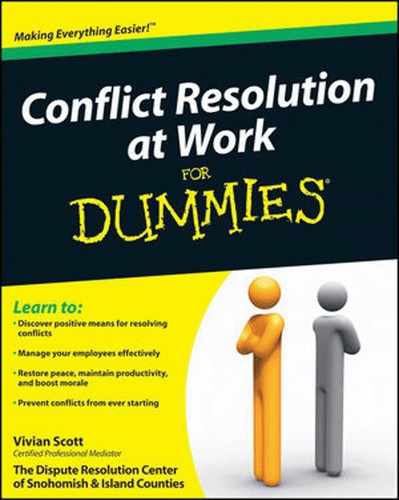Listening carefully to all parties
Focusing on similarities
Steering the conversation toward a solution
Seeing a conflict through to a positive resolution can be life-changing — it certainly has been for me. It's empowering to help others, and yourself, through a difficult time whether you're at work, at home, or at play. My goal with this chapter is to share what I know about mediation and conflict and to take advantage of the fact that I know some really accomplished and insightful mediators. My hope is that some of this expertise will help you turn problems around in your everyday life without having to become an expert in conflict resolution. So I made a list of things I thought you should know, talked to my friends about their best advice, and put it all together to give you these bits of information that I hope you find helpful.
Achieving resolution and securing a signature on an agreement form may be an obvious sign that a conflict conversation has gone well — unless, of course, you steamrolled over the parties and forced them to acquiesce because you wanted to quickly put the surface issues behind you. Striving to improve a working relationship gives you more than a momentary solution. A mediation process that allows the parties to come away with an understanding of the real issues can also deliver broader benefits, such as more collaboration between the two parties, an increase in creativity, and a boost in productivity.
Acting as the judge, jury, and executioner isn't the point of mediating conflict. The purpose of the discussions isn't for you to find out who's telling the truth and who's lying — for the people involved, the stories they share are the truth. Work within a person's point of view to help her find resolution.
Presenting yourself professionally and being open to input from all sides creates a comfortable environment for both parties to be honest with you about what's happening and what they're willing to do to resolve the difficulty.
Note
Get off to a good start by being genuinely interested in the perspectives from all the people involved in the conflict.
Give your full attention to the individuals sitting in front of you during a conversation about conflict — not the computer, not your phone, not the knock on the door. Put the golden rule into play and give others the same care and attention you'd want in the same situation.
People in conflict have a tendency to focus only on differences, and these differences are what keep them fighting. Rather than concentrate on what's dividing them, find the things that bring them together. Common interests and values can be the stepping stones to finding solutions that work for both people. Mediators who are able to keep their clients focused on common interests have successful outcomes more times than not, and you can too. Even if a problem is between you and another person, if you can approach the discussion from the viewpoint of the things you have in common, you stand a better chance of the other person relaxing and hearing what you have to say than you do if you only want to discuss your differences.
People in conflict aren't at their best! Feelings such as hurt, fear, frustration, and anger can drive a person to ridiculous behavior sometimes. That doesn't mean that underneath these feelings a colleague isn't a decent person just trying to get by. Give her the benefit of the doubt, even if you can't see her best qualities at the moment.
Silence is one of my favorite tools! Don't rescue employees when they sit in stony silence. The more uncomfortable they get, the more you demonstrate to them that this is their conflict. If you speak to end the silence, you may take away an opportunity for them to share something important.
Warning
The same is true when you're one of the people involved in a conflict,but be careful not to come across as stubborn or defiant. Use your communication skills to ask about the other person's perspective, and then wait for her answers.
Curiosity may have killed the cat, but it's one of a mediator's best tools! My favorite questions start with, "Help me understand . . ." and "I'm sorry, I'm not quite sure what you meant when you said. . . ." This gets a person talking so I can listen for what's really important to her — that is, her values. (See Chapter 2 for a more in-depth discussion of values.) Priceless!
Giant egos, rude behavior, and bully tactics all come down to the fear of losing something. The bigger the reaction, the bigger the fear. Work to uncover what a co-worker may fear from the conflict and strive to allay her concerns.
Staying in the past is much like circling the drain; around and around we go. Asking parties to share their perspective (what brought them here) is a good way to start a mediated conversation. Everyone needs a chance to tell her side of the story, but repeating (and repeating and repeating) what happened 19 Tuesdays ago doesn't resolve anything. When you feel the perspective has been heard, move to address it properly by focusing the conversation on what she'd like to see on the next Tuesday, what that looks like for her, and how she thinks she could make that happen.
